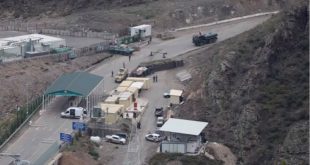Ukraine is set to become an official candidate for European Union (EU) membership, the first step on the long road to joining the 27-country bloc, despite Russia’s strict opposition to the move.
European leaders are expected to officially grant Kiev EU candidate nation status at a summit in Brussels on Thursday, a week after the European Commission recommended granting Ukraine and Moldova the membership candidacy.
Three EU officials told Reuters on Tuesday that there had been no opposition within the 27-nation bloc to granting war-torn Ukraine “candidate status.”
“We are working towards the point where we tell [Russian President Vladimir] Putin that Ukraine belongs to Europe, that we will also defend the values that Ukraine defends,” Luxembourg’s Foreign Affairs Minister Jean Asselborn told reporters before a meeting with other EU ministers.
A French presidential official told reporters in a briefing he expected none of the 27 members to block the candidacy status for Ukraine and Moldova.
“We are forging consensus. At this moment, I can’t say all 27 are agreed but there is reasonable hope to quickly get an agreement on Ukraine and Moldova at the EU Council.”
France’s Minister for Europe Clement Beaune also told reporters after a ministerial meeting in Brussels there was “total consensus” among the 27 members, but it would be up to the heads of state to confirm it.
On Friday, the European Commission proposed taking the symbolic first step to put Ukraine on the path toward EU membership.
Recognition of Ukraine as a candidate country would not guarantee future EU membership, but it’s a symbolic and morale-boosting decision at a time when the former Soviet state is fighting a Russian offensive.
The European countries’ push to enable Ukraine’s EU membership comes while Russia has clearly stated that the prospect runs directly counter to Moscow’s list of “security demands” concerning the ex-Soviet republic.
Ukraine braces for Russian ‘storm’ in east
Meanwhile, Ukrainian President Volodymyr Zelensky has warned that Russia may increase its military attacks in retaliation for the EU’s decision to give Ukraine candidate status.
In an address late Monday, Zelensky acknowledged the difficulties the country was facing in the east as Russian forces advance on the strategic city of Severodonetsk and its sister city, Lysychansk.
“We are defending Lysychansk, Severodonetsk, this whole area, the most difficult one. We have the most difficult fighting there,” he said. “But we have our strong guys and girls there.”
Severodonetsk has been the epicenter of the battles in eastern Ukraine for control over the industrialized Donbass region, made up of the Luhansk and Donetsk provinces.
Luhansk regional governor Serhiy Gaidai also said Russian forces had launched a massive attack and gained some territory on Monday though it was relatively quiet overnight. “It’s a calm before the storm,” Gaidai said.
He said Russian forces controlled most of Severodonetsk, apart from the Azot chemical plant, where more than 500 civilians, including 38 children, have been sheltering for weeks.
Meanwhile, several EU countries are pushing to start work on a new package of sanctions against Russia and Belarus over the ongoing conflict in Ukraine.
About one-third of the 27 EU governments, mostly Nordic and eastern states, want the EU Commission to begin work on a seventh round of sanctions, diplomats told Reuters, adding that they also want to grant more military support to Kiev.
 Alghadeer TV Alghadeer TV
Alghadeer TV Alghadeer TV
